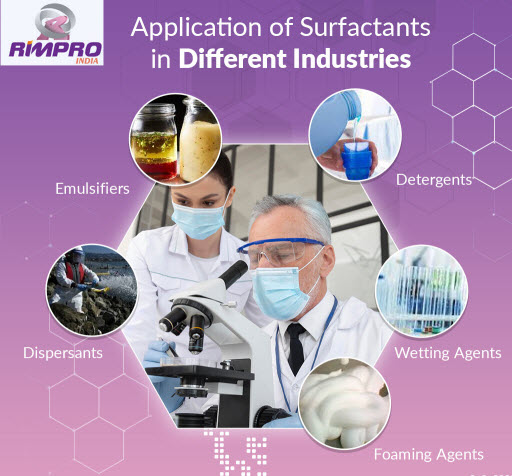Cleaning has become an integral part of our daily lives. Whether it’s washing dishes, doing laundry, or scrubbing floors, we rely on various cleaning agents to make our chores easier. One key component that plays a crucial role in cleaning products is surfactants.
Surfactants, also known as surface-active agents, play a crucial role in various applications ranging from oil spill clean-up to shampoo formulation. These versatile compounds have the ability to lower the surface tension between liquids or between a liquid and a solid, making them invaluable in several industries.
How do surfactants work?
Surfactants work by reducing the surface tension between two substances, such as water and oil. This reduction in surface tension enables the surfactant molecules to spread and disperse throughout the liquid, facilitating the mixing of different components that would otherwise separate.
One way surfactants achieve this is by aligning themselves at the interface between water and oil. The hydrophilic portion of the surfactant molecule interacts with the water molecules, while the hydrophobic portion attaches to the oil molecules. This process creates small aggregates called micelles, which encapsulate the oil droplets and prevent them from reuniting.
Surfactants in Oil Spill Clean-up
Oil spills pose a significant threat to marine ecosystems, and the use of surfactants has proven to be crucial in mitigating their impact. Surfactants are typically applied either from boats or aircraft, where they are sprayed onto the oil slick. These chemicals work by surrounding the oil droplets, reducing their cohesion, and preventing them from reaggregating. This allows natural processes, such as microbial degradation, to break down the oil more efficiently.
Surfactants in Personal Care Products
One of the most common applications of surfactants is in personal care products, particularly in shampoos and soaps. Surfactants function as primary cleansing agents in these products, enabling the removal of dirt, oils, and other impurities from the skin and hair. Additionally, surfactants help create lather, enhancing the sensory experience of using these products.
In shampoos, surfactants play a crucial role in emulsifying and dispersing oils, allowing them to be rinsed away easily. They help solubilize the sebum and other oily substances on the scalp, providing effective cleansing.

Surfactants in Industrial Cleaning
Surfactants also find extensive use in industrial cleaning processes. The ability of surfactants to lower surface tension and break down grease and dirt makes them ideal for industrial cleaning. Whether it’s removing oil stains from machinery or degreasing surfaces, surfactants play a vital role in achieving effective cleaning results. These compounds help to lift and suspend contaminants, allowing them to be easily rinsed away.
Surfactants used in industrial cleaning formulations come in various types, such as non-ionic, anionic, cationic, and amphoteric. Each type offers different properties and advantages depending on the specific cleaning requirements.
Surfactants in Agriculture
In the agricultural industry, surfactants are utilized in the formulation of herbicides and pesticides. These chemicals help enhance the effectiveness of agricultural chemicals by improving their spread ability and absorption onto plant surfaces. Surfactants reduce the surface tension of spray solutions, enabling better coverage and penetration of active ingredients, thus maximizing their efficacy.
Furthermore, surfactants assist in breaking down waxy cuticles on leaves, allowing herbicides and pesticides to reach their target sites more efficiently. This results in improved weed control and pest management while reducing the amount of chemicals required.
Surfactants in the Pharmaceutical Industry
Surfactants play a critical role in the pharmaceutical industry, particularly in drug formulation and delivery systems. They are used to enhance the solubility and bioavailability of poorly soluble drugs, improving their absorption and effectiveness.
In drug formulation, surfactants act as solubilizers, helping to dissolve hydrophobic drug compounds into aqueous solutions. This enables the formulation of liquid suspensions, emulsions, or self-emulsifying drug delivery systems.
Surfactants also aid in the creation of stable emulsions for intravenous drug delivery. By forming small droplets of one liquid dispersed in another, surfactants ensure proper mixing and prevent phase separation, ensuring the uniform distribution of drug particles.
Surfactants in the Food and Beverage Industry
Surfactants find various applications in the food and beverage industry, where they serve as emulsifiers, dispersants, and stabilizers. They are crucial in the production of food products such as sauces, dressings, and beverages, where the uniform dispersion of oil or fat is desired.
Surfactants help create stable emulsions by reducing the interfacial tension between oil and water, preventing phase separation. This results in improved texture, mouthfeel, and appearance of food products. Surfactants also aid in the dispersion of flavors, colors, and functional ingredients, ensuring their homogeneous distribution.
